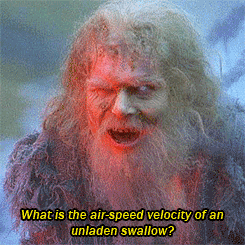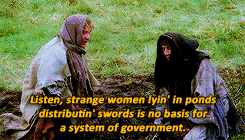“Normal is a Social Construct (and hella lame) – Michel Foucault and the Quest for the Holy Grail,” by schadenfreudessa
(or what Monty Python can teach us about the rules of discourse)
So we all love Monty Python, right? Quest for the Holy Grail is wonderful humorous trash that gives us so many quotable lines, full of comedy gold like:
And
But does this cult classic also teach us about the power of discourse and the rules that control that power?
It certainly does.
Michel Foucault was a French social theorist of the 20th century, well known for his writings on psychology, madness, and sexuality. He also wrote about discourse, or how we communicate. Foucault proposed that discourse is power, and that institutions maintained their power over people through control of discourse. In The Discourse on Language, Foucault lists a series of unspoken rules that are used to control discourse, and therefore power.
What does this have to Monty Python and the Quest for the Holy Grail, though? Well, the film shows us some of these different rules in action, and more importantly, how to break them.
Foucault’s first rule is that of Prohibition – there are topics and things that we just don’t talk about at certain times or at all. This can be seen at the towards the beginning of the film in the ‘Bring Out Your Dead’ scene.
The scene presents the topic of murder being discussed extremely casually as a man tries to drop a person onto the cart of dead bodies. The concerns expressed in the scene aren’t about committing murder, either legally or morally. Instead, murder is discussed like it’s a business practice, a deviation from the normal into the ridiculous. This isn’t the reality that most of us know – murder and death are srs bzns.
So srs.
This deviation from the norm is what makes the scene funny. The prohibitions that prevent us from talking about murder, especially in such a blasé manner, are being violated. Prohibitions that exist within reality are sexuality and politics, which are not to be discussed in “polite society”. That these two subjects are taboo reinforces discourse’s connection to power and desire – if we don’t talk about politics or sex, then we won’t engage in politics or have sex.
Maybe we’ll take up music instead.
Another rule that gets broken in the move is Discipline. The rule of Discipline deals with theoretical fields, like different branches of science or a period of art. This field constrains and limits what kind of discourse can be used – like how you wouldn’t write about the history of communism in a paper for your biology class.
This can be observed in the death of ‘A Famous Historian’. Here, the film switches styles – disciplines – to set itself up like a documentary. It features an old man in stereotypical ‘British Professor’ clothing speaking directly to the viewers about the facts of Arthur’s quest, much like a documentary. However, the narrators in most documentaries don’t have their throats slit by passing knights on horseback. This breaks the rule of Discipline by including elements to this style of cinema that traditionally don’t belong there, which is a very common theme throughout the Quest for the Holy Grail.
Arguably, ass trumpets don’t belong to any form of family-friendly cinema.
One topic that Foucault deals heavily with in several of his works is the concept of madness. One of his first works is Madness and Civilization, and the topic comes up again in Foucault’s rules. Madness in discourse is speech that has been either deemed as being entirely irrational or conveying some preternatural message – either lacking true meaning or too true. The speech of the insane is therefore ignored or given special weight as somehow more rational than the speech of the sane.
Monty Python gives us one such madman who appears to Arthur early in his Quest but also reappears later on as the toll-keeper to the Bridge of Death. Here, he is in the role of the guardian of knowledge, purveyor of mystical powers who has knowledge of the Holy Grail. Then he goes and fucks it up over a question about swallows and gets jettisoned from his own post.
That moment when the Madman – who before this has been speaking rather cryptically – breaks character in his confusion is when his speech moves from the realm of madness and into normality. He loses the status of madman and the power that he held with that status because he doesn’t follow the prescribed division between insane and sane discourse. So he gets thrown off a cliff, as is only appropriate.
Perhaps the most powerful example of the breaking of Foucault’s rules of Discourse comes from dear Dennis the Constitutional Peasant. Dennis breaks a lot of rules in his tirade against King Arthur, but the center-most one is that of Ritual. Ritual describes, essentially, who can say what and how they can say it. It describes the roles of a speaker, and who that speaker can be, but it also controls what gestures and words are appropriate, what significance those elements carry, and how they effect the audience.
Dennis completely ignores all of this.
Not only is he a peasant, who should in no way be qualified or educated enough to discuss politics, but he is debating politics with the King of the Britons. His tone and word choice are clearly disrespectful, and he straight out refuses to acknowledge the power and authority of King Arthur. He breaks every bit of ritual that state how one should address a King, and he refuses to stay within his assigned role. Dennis just rips King Arthur a new one and disregards the authority that he claims to wield.
Dennis is also a perfect example of what can happen when people ignore the Rules of Discourse. These Rules are in place to keep power in the hands of those who already have it, after all, so by breaking these rules, we can shake the foundations of the current power hierarchy in society. This is exactly what Dennis does, and we see King Arthur’s power reduced to nothing. The discourse that gives him that power and the rules which preserve it are not able to withstand such an assault from Dennis, and Arthur has no allies or armies to force his claim. He has no recourse but to flee in the very end after even physical violence can’t shut Dennis up, and his power in this situation is worthless because one mouthy peasant broke the rules.
This is not the only scenario in Monty Python and the Quest for the Holy Grail where King Arthur’s authority is challenged because someone refuses to obey the Rules of Discourse, but it is the most obvious one. Throughout the entire film, Arthur is tricked, ignored, taunted or refused despite his supposed status as a King. It’s a bit inspiring in a way for all that the movie is completely ridiculous. Embrace your inner Dennis. Learn these Rules of Discourse, so that in the future, you may break them and lay waste to your oppressors like a valiant Knight of Camelot.
More Information about the Rules of Discourse
Credits for Images:
Andy from Seven Inches of Your Time (x)
Asgardian-Poledance (x)
Aveleyman (x)
Bonnef (x)
Botherfigure (x)
DrCranquis (x)
FYFlyingCircus (x)
Weknowmemes (x)
“Normal is a Social Construct (and hella lame) – Michel Foucault and the Quest for the Holy Grail” ©schadenfreudessa













Pingback: The Fan Meta Reader 2015 Masterpost | The Fan Meta Reader